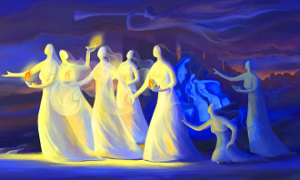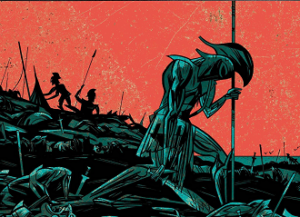
Posts Tagged ‘God’
Prophecies about the coming of Jesus
There were many prophecies about the coming of the messiah, although Isaiah’s is the most cited (Isaiah 7:14): “therefore the Lord himself will give you a sign: Behold, the virgin will conceive, and will give birth to a son, and will call him his name Emmanuel.”
coming of the messiah, although Isaiah’s is the most cited (Isaiah 7:14): “therefore the Lord himself will give you a sign: Behold, the virgin will conceive, and will give birth to a son, and will call him his name Emmanuel.”
What does God mean with us, so is the first argument that Jesus was God”, but Zechariah’s eight visions are interesting for two reasons: that he spoke most about messianic prophecies and that his name is that of the father, the last and greatest of the prophets John the Baptist, Zechariah means “remembered by God”.
Thus the prophet Zechariah, who is not Elizabeth’s husband, among his various prophecies, predicted the coming of the Messiah to Jerusalem and the rejection by His people (Zechariah 9,11).
Bethlehem was a small village, the birthplace of King David, and the prophet Micah (5:2) who predicted the hometown of Jesus, was said to be from Bethlehem of Ephrath, from the clan of Judah (one of the 12 tribes of Israel born from the children of Israel, Jacob’s new name), said Micah: “But you, Bethlehem Ephrathah, though you are small among the clans of Judah, from you will come to me one who will be ruler over Israel. Its origins lie in the distant past, in ancient times.”
Yes, because a prophecy in the first biblical book, which states that from the Jewish people (Hebrews at the time of Abraham), nine people will be born, is in Genesis (12:2-3):
“I will make you a great people, and I will bless you. I will make your name famous, and you will be a blessing. I will bless those who bless him, and I will curse those who curse him; and through you all the peoples of the earth will be blessed”, see that the prophecy goes beyond the Abrahamic peoples, although there are Jews and Christians who do so.
And finally the prophet made to David in Psalm 89:3-4: “I made a covenant with my chosen one, I swore to my servant David: “I will establish your lineage forever and I will establish your throne for all generations”.
Joseph, Mary’s husband, went to Bethlehem (prophesied by Micah) because he was from David’s lineage and his son should be registered there, so it is also a historical fact, as there was a sense when Jesus was born.
Someone who knows the Bible may ask and John the Baptist, yes he baptized Jesus and did not prophesy but announced (or if you prefer the greatest prophesy), after me will come one “who am not worthy even to untie his sandals” (John 1:27), well whoever untied his sandals slaves were to wash the feet and John the Baptist did not even consider himself worthy of this.
There are so many prophecies, and the fit is so divine and logical (the sense that Jesus told, for example), that the sign of his birth is divinely and humanly clear.
Narratives, Palestine and Israel
Primary orality, a period before printed writing, was the way of transmitting stories and the culture and tradition of people through narration. We live in modern printed culture and now a culture called “post-narrative” by Byung Chul Han emerges.
Says Han: “Today everyone talks about narrative. The paradox is that the inflationary use of narratives reveals a crisis of narration itself”, he says at the beginning of his book “The Crisis of Narration”, establishing an opposition between narratives and narration.
Prophets and oracles were responsible for narratives in the period before writing. It is worth remembering that scribes and clay tablets were present in archaic cultures, however, it was the narrative that sustained traditions in oral cultures, including original ones.
A modern interpretation, made by Walter Ong, disciple of Marshal McLuhan, is that myths were used as a mneumotechnical process, that is, “hooks” so that the narrative did not deviate from the initial narrative, maintaining cultures and traditions, thus great works of Western culture such as Iliad and Odyssey can be reread in this aspect.
The prophets do not differentiate themselves from these cultic aspects, they have the pretension or in fact they can be divine revelations, since numerous facts in these narratives reveal divine intervention, the departure of Abram (only later to be called Canaan) from the region of Chaldea, giving rise to the Hebrew people, which meant on the other side of the river, until the arrival of the region where his son Isaac will be born, but he will also have a son with the slave Hagar, called Ishmael, and only later will he have a son with Sarah, Isaac who will have two sons Esau and Jacob (later called Israel, he who wrestled with God).
Already in the mother’s womb the two were fighting and the biblical narrative says, Genesis 25:23: “And the LORD said to her: Two nations are in your womb, and two peoples will be divided from your womb: one people will be stronger than the other. other people, and the greatest will serve the least”.
and the biblical narrative says, Genesis 25:23: “And the LORD said to her: Two nations are in your womb, and two peoples will be divided from your womb: one people will be stronger than the other. other people, and the greatest will serve the least”.
From conception, the biblical narrative reveals two people in struggle, Rebekah was sterile and when she gave birth to the twins, Esau was born first for a few minutes and was supposed to inherit the tribes, but Jacob, using a trick of pretending to be his brother who was hairy, went to his father who is almost blind and asks him to bless him, which he does, but later realizing that he would have to fight with his brother, says the narrative, in a region called Jabbok ford (a tributary of the Jordan) he fights with an angel for God to bless him, and from then on he is called Israel, meaning one who fights with God.
However, the Ishmaelites will continue to exist and are not to be confused with the Palestinians, who come from the ancient people called Philistines, initially they were on the southwest coast of Canaan, forming Philistia, despite having adopted the local Canaanite culture, studies point to an Indo-European origin for countless words and even in the first wars they already knew how to make steel, while the Israelites still mastered bronze (in the photo the map from 830 BC).
«Origem dos filisteus pode ser finalmente revelada por DNA antigo». National Geographic. 15 de julho de 2019 (in portuguese).
Blessed Duns Scotus
The wisdom and depth of the teachings of this 13th century Franciscan friar, however, took 9 centuries to be recognized and venerated by the Catholic Church. It was only during the Pontificate of John Paul II that he was beatified and recognized as a saint.
century Franciscan friar, however, took 9 centuries to be recognized and venerated by the Catholic Church. It was only during the Pontificate of John Paul II that he was beatified and recognized as a saint.
Pope Francis in a recent homily extolled the qualities of Scotus, stating: “There are great scholars, great specialists, great theologians, teachers of the faith, who have taught us many things. They penetrated the details of Sacred Scripture (…), but they could not see the mystery itself, the true core (…). The essentials remained hidden! (…)”.
Gifted with a brilliant intelligence and driven to speculation, this intelligence for which he earned the title of Doctor subtilis “Subtle Doctor”, Duns Scotus was directed to study philosophy and theology at the famous universities of Oxford and Paris and his work
Endowed with a brilliant intelligence and driven to speculation – this intelligence for which he earned the title of Doctor subtilis, “subtle Doctor” from tradition -, Duns Scotus was directed to the studies of philosophy and theology at the famous universities of Oxford, Cambridge and Paris , and thus his works received the titles of Opus Oxoniense (Oxford), Reportatio Cambrigensis (Cambridge), Reportata Parisiensia (Paris).
Among his mystical works are studies on the incarnation, in Reportata Parisiense he wrote: “To think that God would have renounced this work if Adam had not sinned would be totally irrational. I say, therefore, that the fall was not the cause of Christ’s predestination, and that, even if no one had fallen, neither angel nor man, in this hypothesis Christ would still have been predestined in the same way” (in III Sent, d 7.4).
Duns Scotus, still aware that, in reality, because of original sin, Christ redeemed us with his Passion, Death and Resurrection, reaffirms that the Incarnation is the greatest and most beautiful work in the entire history of salvation and that this is not conditioned by no contingent fact, but is God’s original idea of finally uniting all created things with Himself in the person and flesh of the Son.
Pope Paul VI also declared this vision of the incarnation affirmed in Scotus: “strongly “Christocentric”, it opens us to contemplation, stupor and gratitude: Christ is the center of history and the cosmos, he is the One who gives meaning, dignity and value to our lives.” (homily of November 19, 1970).
Not only the role of Christ in the history of salvation, but also that of Mary is the object of reflection in Doctor subtilis. At the time of Duns Scotus, most theologians opposed an objection, which seemed insurmountable, to the doctrine according to which Mary Most Holy was exempt from original sin from the first moment of her conception: the dogma of the Immaculate conception of Mary, defended by Scotus centuries before the Catholic Church declared it.
Scotus was so convinced of this dogma that he was buried in the church of the Immaculate Conception of the Virgin Mary (photo), in Cologne, Germany, where he died on November 8, 1308.
Between immortality and eternity
It is not just a spiritual theme as it seems, Hannah Arendt’s Vita Activa cited by Byung-Chul is a course correction, to remove us from simple mortal temporality, to the “time that is proper to the gods, who do not die and do not age , and the immortal cosmos” (Han, 2023, p. 145), where he differentiates immortality from eternity.
Arendt’s Vita Activa cited by Byung-Chul is a course correction, to remove us from simple mortal temporality, to the “time that is proper to the gods, who do not die and do not age , and the immortal cosmos” (Han, 2023, p. 145), where he differentiates immortality from eternity.
The search for immortality is, again Han quoting Arendt, “the source and center of the vita activa”. According to the author, “human beings achieve their immortality on the political stage. On the other hand, the objective of the vita contemplativa is not, according to Arendt, to persist and last in time, but the experience of the eternal, which transcends both time and the surrounding world” (Han, 2023, p. 145), in other words, immortality is the senseless search for the political stage, while eternity is the search for the experience of eternity already here and now.
But the author warns that the human being cannot linger on the experience of the eternal, “he needs to return to his surrounding world” (idem), when comparing it with the thinker, as soon as he starts writing he abandons the experience of the eternal , this is how one dedicates oneself to active life, and it is in this that one hopes to achieve immortality, Arendt admires Socrates who does not write, although Arendt herself thought and recorded her thoughts with the intention of immortality (Han, 2023, p. 146), but the Writing can be a contemplation, says the author.
In Byung-Chul’s view, the way Arendt sees Plato’s myth of the cave is actually a completely different story, it is of a philosopher who frees his companions from the chain of the shadows that waver before them, which they consider the only reality (page 147-8), Plato asks Glaucon to imagine: what would happen to philosophers if, after having seen the truth, they returned to it and tried to free prices from illusions? (page 148).
“Parehesia” (opening of the truth) is a risky situation, “the philosopher acts, when despite the danger of death, returns to the cave” in order to convince them of the truth, thus the action precedes the knowledge of the truth, while contemplation is the path from knowledge to truth, which precedes action (page 149).
After all, the Greek polis itself and Plato’s thought originated in the dialogues of Socrates written by Plato himself, this is a contemplative and discursive truth (I would say dialogical, but the term can have dubious interpretations), so action precedes thought in Plato.
According to Hans’ criticism, the idea that the loss of contemplative capacity led to the victory of the “animal laborans” that subjects everything to work with the consequent loss of contemplative capacity and its reintegration into nature and the planet.
Han quotes Saint Gregory, a master of the vita contemplativa: “when a good life program demands that one pass from the active to the contemplative life, it is often useful for the soul to return from the contemplative to the active life, in such a way that the flame of contemplation awakens in the heart surrender all its fullness of activity” (page 151), this is how eternity on earth is lived.
HAN, B.C. (2023). Vita Contemplativa: In Praise of Inactivity, transl. Daniel Steuer, USA, ed. Polity (the page numbers is in brazilian text).
The society that comes
This is the title of the last chapter of Chul Han’s book “Vita contemplativa”, in which he analyzes the religious crisis and its consequences for culture, being and current society.
“Vita contemplativa”, in which he analyzes the religious crisis and its consequences for culture, being and current society.
It begins by stating: “the current crisis of religion cannot be reduced simply to the fact that we have lost faith in God or become suspicious of certain dogmas” (page 153), it resides in the fact that we have lost the capacity to contemplate, a growing coercion Both communication and production make “contemplative time” difficult, there is no way to “stop”.
He quotes Malebrance who said that attention is like a “natural prayer of the soul”, our hyperactivity can be blamed on religion, “the crisis of religion is a crisis of attention” (page 154), and the worst thing is that the author does not points out, fanaticism dominates “attention”.
The author says “listening is the verb for religion” (page 155), but it is also for meditation, study, contemplation and reflection, whatever the threshold principle of a thought, it requires a stop, an inactivity.
In the current thought of romanticism, “freedom is decoupled from the self”, action gives way to listening: “only the tendency to intuition, when directed towards infinity, puts unlimited freedom in mind” (page 159) says the author now quoting Schleiermacher.
Still quoting Schleiermacher, he writes that tears interrupt the “spell that the subject places on nature” (page 160), dissolved in tears, the subject surrenders to the Earth.
Now quoting Agamben in “The Coming Community” he states about the coming kingdom of the Messiah that Walter Benjamin would have told Ernest Block and is quoting in Han:
“a rabbi, a true Kabbalist, once said: to establish the kingdom of peace, it is not necessary to destroy everything and start a completely new world; it would be enough to move that cup or that bush or that stone a little bit, and all things in the same way. But this little bit is so difficult to achieve and its measure so difficult to find that, as far as the world is concerned, men cannot achieve it and the messiah must arrive” (Aganbem apud Han, 2023, pg. 171).
It is this arrival, called parousia (a new coming for Christians) that is also celebrated at Christmas.
HAN, B.C. (2023). Vita Contemplativa: In Praise of Inactivity, transl. Daniel Steuer, USA, ed. Polity.
The Parable of the Wise Virgins
The parable is a parable, therefore it should not be taken literally, it may seem to refer to sexuality, the fact that 5 virgins have oil for the whole night and another 5 do not have enough oil, indicates that we must prepare well when the “ bridegroom” arrives, in the biblical case it is the encounter with God, and the oil means the “habit” that we develop in life to get there.
should not be taken literally, it may seem to refer to sexuality, the fact that 5 virgins have oil for the whole night and another 5 do not have enough oil, indicates that we must prepare well when the “ bridegroom” arrives, in the biblical case it is the encounter with God, and the oil means the “habit” that we develop in life to get there.
We discussed several aspects of prudence, and differentiated a “good life” (happiness in a broader sense) from temporary happiness (eudaimonia) that does not keep the lamps on, and here not only for eternal life, but for the course of our lives.
In a way, there is something to it since it is prudent to understand that there must also be prudence at this point, toxic, chauvinist, sexist relationships, etc., because these too can prepare us for a future life, even if it is still earthly, balanced and sensible, remember It is clear that both Aristotle and Thomas Aquinas also see rational reasons for exercising prudence.
Thus, a society that acts on impulse, through the control of passions over reason, and a long and lasting good life (in the Greek sense) depends on the exercise of virtues, and avoiding many situations of risk and irrationality depends on the exercise of virtues.
For those who don’t know, the parable of the wise virgins is this, where the bridegroom is the encounter with eternal life (Mt 25,1-7):
“The Kingdom of Heaven is like the story of the ten young women who took their oil lamps and went out to meet their bridegroom. Five of them were improvident and the other five were provident. The improvident ones took their lamps, but they did not take any oil with them. The foresighted ones, however, took vessels with oil along with the lamps. The groom was taking a while, and they all ended up dozing off and sleeping. In the middle of the night, a cry was heard: ‘The bridegroom is coming. Go to meet him!’ Then the ten young women got up and prepared the lamps.”
Prudence does not limit our happiness, but prepares us for future life, here on the earthly plane.
Your fathers rejected the prophets
After the period of the Judges, which was a truly theocratic period, ended, the people of Israel began to ask for Kings (Samuel 8,6-8), the kings ruled from 928 BC until the destruction of the first temple in Jerusalem (586 BC), but the people had already gone into captivity in Babylon in 722 BC, more than 100 years later the kingdom of Judah was destroyed.
truly theocratic period, ended, the people of Israel began to ask for Kings (Samuel 8,6-8), the kings ruled from 928 BC until the destruction of the first temple in Jerusalem (586 BC), but the people had already gone into captivity in Babylon in 722 BC, more than 100 years later the kingdom of Judah was destroyed.
Already in the last period of the judges, Samuel, who was also a prophet, saw the people going astray, and even his children no longer followed divine laws, the very division between Israel and Judah (it must be said that this is where the name of Jews), and was the second king of Israel, David, who unites the two kingdoms and names the capital Jerusalem, where his son Solomon will build the first temple.
It was the prophet Ezekiel who lived in Babylonian exile, between 593 BC and 571 BC, who prophesied the destruction of the temple and spoke of the infidelities of the Hebrew people, the prophet Isaiah had also preached that sin had reached Israel and Judah in such a way that the curse would hit the Hebrew people, the biggest of which, of course, was the exile from Babylon.
When Cyrus becomes king of Persia and takes Babylon in 538 BC, he allows the Hebrew people to return to their land and the possibility of rebuilding their temple, the second, but the people’s deviations continue to occur until the last and greatest of the prophets John the Baptist , the one whose head Herod asked for in exchange for Salome’s dance, which he asks for at his mother’s suggestion.
Jesus was rejected for challenging the Pharisees and teachers of the law of his time, there were also those who wanted a leading position in the war against the Roman empire, after the death and resurrection of Jesus in the year 70 AD, the second temple was destroyed by the general Roman Titus and only the wailing wall remained (photo).
Jerusalem was burned and the Jewish people were dispersed, the Jews who settled in Eastern Europe were called Ashkenazi and those from the Iberian Peninsula Sephardim.
Jesus’ position on the Roman empire was clear, since the Romans also feared him, Herod especially, and Pilate washed his hands at his crucifixion, when the Pharisees set a trap asking if it was fair to pay taxes, Jesus takes a coin and upon seeing the figure of Caesar he says: “Give to Caesar what is Caesar’s and to God what is God’s” (Mt 22,34-40) this trap remains in religious circles to this day.
So what is it to believe?
We already believed many things that were not true, the sun is not the center of our galaxy, at the center is a Black Hole, and both matter and dark energy seem to defy current laws called Standard Physics, a scientist said that God did the division by 0 and everything could have miraculously come out of Nothing.
the sun is not the center of our galaxy, at the center is a Black Hole, and both matter and dark energy seem to defy current laws called Standard Physics, a scientist said that God did the division by 0 and everything could have miraculously come out of Nothing.
If we closely examine the beliefs, in all of them there is the golden rule: do not do to others what you would not want done to you, especially Jesus said about the greatest commandment (Mt 22, 37-40): “You shall love the Lord your God with all your heart, with all your soul, and with all your mind!” This is the greatest and first commandment. The second is similar to this: ‘Thou shalt love thy neighbor as thyself’. All the Law and the prophets depend on these two commandments.”
Without this, we fall into an eye for an eye, a tooth for a tooth, said the philosopher Byung Chul Han about one of the inaugural books of our era, the poem Iliad (8th century BC) (in picture image of the Pablo Delgado), its first word is “menin, namely cholera [Zorn] : “sing, goddesses, the wrath of Achilles son of Peleus” (p. 22), thus human culture, especially Western culture, is founded on violence and the philosopher points out that ‘the disintegration of today’s society does not cease to exist the epic energy of rage.” (pg. 23).
The divine opposition of pacifism is not just a historical inversion, it is in this moment of civilizing crisis the real possibility that the process advances and that humanity does not massacre itself.
It is true that there is not even a correct view of Deus Homo Jesus, he was not a warrior, a miracle worker and if he did so he always asked for discretion, he never did so by an exhibitionist or triumphalist act, he did not stimulate any type of anger, even that the falsehood of many religionists irritated him, and he always asks the disciples: “who do they say that I am”.
In Matthew 16, 14 after asking this: they replied: “Some say that he is John the Baptist; others, that it is Elijah; still others, that it is Jeremiah or one of the prophets”.
And then they are asked why only true disciples recognize Homo Deus love and mercy (Mt 16:16) and Peter replies: “You are the Messiah, the Son of the living God”.
As in the time of Jesus and throughout history there have always been false prophets and disciples, but Jesus warns that it is only from the good tree that good fruits sprout, so the distinction is simple.
Han Byung-Chul (2018) No Enxame: Perspectivas do digital (“In the swarm: Perspectives of the digital”), trans. Lucas Machado, Br, Petrópolis: Vozes.
God and time do not exist
We hardly explain quantum physics and general relativity well and physics seems to be in crisis, philosophers and physicists seem to have found strange paradigms and phenomena in observations of the universe and particle physics, what is the relationship with God, to exist is in space-time.
relativity well and physics seems to be in crisis, philosophers and physicists seem to have found strange paradigms and phenomena in observations of the universe and particle physics, what is the relationship with God, to exist is in space-time.
It is not the discovery of the Higgs particle or God particle, its existence proven, but an ontological speculation that is now taken seriously, we always affirm a principle of duality, that is, A is false or True and it cannot be the two two at the same time and also if we go from A to B we must go through intermediate B, this is the traditional ontology.
Thus, from the pre-Socratics to Kant, time was absolute and this physics was proven, however the physical discovery of the third included, this so-called “level of reality” brings the contemporary questioning of the questioning of what is existence and Being, a new scientific approach , social and spiritual under a method called Transdisciplinarity.
It was not religious people who proclaimed it, but physicists like Barsarab Nicolescu, educators and philosophers like Edgar Morin and artists like Lima de Freitas, a Portuguese serigrapher and painter, who signed Arrábida’s Charter of Transdisciplinarity.
For theologians and mystics who agree with this principle, God exists since he entered history through the “Deus Homo” Jesus, God is through the eternal divine Being, and God is communication through the Holy Spirit, the Trinitarian hypothesis seems perfect.
If there were divine manifestations, theophanies almost always subject to contestation despite innumerable contestations, both theoretically and practically, a moment of great opening of the “clearing” of a general conscience seems ever closer.
Of course, there are counterfeiters, as there have always been in philosophy, science and religion, where fantasy and imagination can take wing, but there are serious people who know that the phenomenon exists at least in the consciousness of billions of believers around the world, in all cultures and also scientists, philosophers and serious psychologists have their beliefs.
The present reality, at the same time that counterfeiters and false prophets have increased, seems to approach that moment in which the historical Homo Deus Jesus affirmed (Jn 1,51): And Jesus continued: “Verily, verily, I say unto you, You shall see heaven opened and the angels of God ascending and descending on the Son of Man,” hich was how Jesus curiously referred to his own existence to say that he became man.
Events in many aspects seem to converge towards this and it is great hope for a confused humanity, a civilization in crisis and a harsh reality.
The eclipse of god
Martin Buber’s book with this name deals with how we can find in the philosophy and history of religion, from pre-Socratic philosophers to 20th century thinkers, an interpretation of Western beliefs, with emphasis on the relationship between religion and philosophy, with ethics and Jungian psychology, which was worth a reply from Jung and a rejoinder from Buber.
how we can find in the philosophy and history of religion, from pre-Socratic philosophers to 20th century thinkers, an interpretation of Western beliefs, with emphasis on the relationship between religion and philosophy, with ethics and Jungian psychology, which was worth a reply from Jung and a rejoinder from Buber.
We live, as Buber says, in a time of God’s eclipse, when seeing the Moon pass in front of the Sun, it seems that it no longer exists, when in fact it is covered up, this is curious, because the controversy with Jung is caused by a question in In an interview about the existence of God, Jung replied: “I don’t need to believe, I know” (Jung, 1977, p. 428).
This caused a furor at the time and even today books like God: a Delusion (the title in English is The God delusion) we find a quote on page 51, in a book that shows Dawkins’ delusions more than the delusions of those who believe, mainly what in philosophy it refers to the Absolute, whose culmination of Western elaboration is Hegel’s abstract concept of the Absolute.
Hegel’s absolute, which is an articulation between the dualistic objective and subjective of idealism, is a singularity of a substantial power, proper to subjectivity and the concept as having a universal substance, which through abstraction becomes effective in self-consciousness and becomes if equal to essence, an essential I-myself species.
Jung’s later comment, expressed chiefly in a letter to a friend which has been published, he explains: “Whatever I perceive from without or from within is a representation or image…caused, as I rightly or wrongly suppose, by a corresponding “real” object. But I have to admit that my subjective image is only roughly identical to the object… our images are, as a rule, of something… the God-image is the expression of an underlying experience of something I cannot reach by intellectual means…” (Jung, 1959).
Jung’s response, without articulating it in an implicitly philosophical way, is a response to idealist subjectivism, it cannot be reached through reason, it is an object of faith, of belief and whoever has it has it inside and out while being at the same time subjective and objective.
The biblical passage that best illustrates this feeling is the one (Jn 15, 45-46): “The Kingdom of Heaven is also like a buyer looking for precious pearls. When he finds a pearl of great price, he goes and sells all his possessions and buys that pearl.”
Jung, C.G. (1977) The Face do Face entrevista in C.G. Jung Speaking: Interviews and Encounters, Princeton, Belligen paperbacks, p. 424-439.
Jung, C.G. (1959), Letter to Valentine Brooke in C.G. Jung Letters, Volume 2, 1951-1961, edited by Gerhard Adler, (London: Routledge and Kegan Paul), pp. 525-526, 1959

